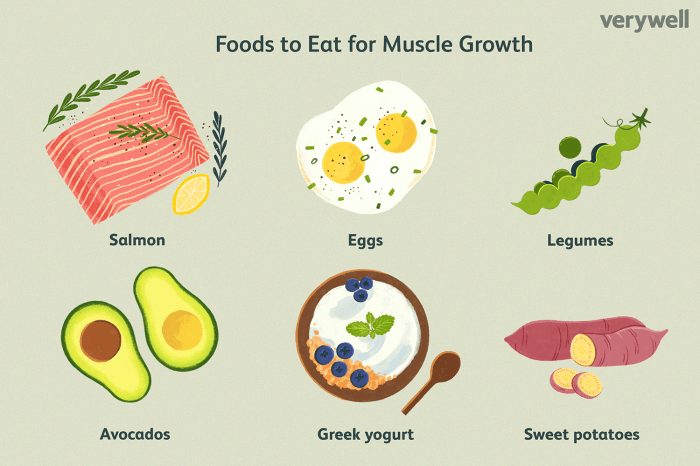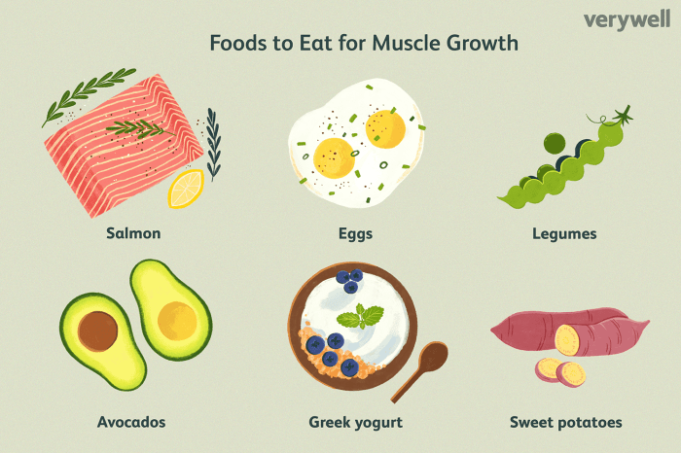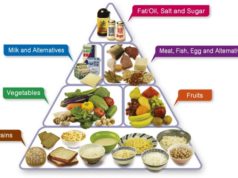How to diet for muscle gain is a question many fitness enthusiasts ponder. Building muscle requires more than just lifting weights; it demands a strategic nutritional approach. This guide delves into the science behind muscle growth, outlining the crucial role of diet in achieving your fitness goals.
Understanding the relationship between diet and muscle gain is essential. Your body needs a calorie surplus to fuel muscle growth, meaning you need to consume more calories than you burn. This surplus provides the building blocks for muscle tissue, primarily protein, but carbohydrates and healthy fats play equally important roles. By strategically adjusting your macronutrient intake, you can optimize your diet for muscle gain.
Understanding the Basics
Your diet is the foundation of your muscle-building journey. It fuels your workouts, provides the building blocks for muscle growth, and helps you recover effectively.
The Relationship Between Diet and Muscle Gain
Your body needs adequate nutrients to repair and rebuild muscle tissue after exercise. This is where your diet comes into play. The food you eat provides the essential nutrients, including protein, carbohydrates, and fats, that your body needs for muscle growth.
The Importance of Calorie Surplus for Muscle Growth
To build muscle, you need to consume more calories than you burn. This is known as a calorie surplus. A calorie surplus provides your body with the extra energy it needs to build new muscle tissue. The amount of calorie surplus needed will vary depending on your individual goals, activity level, and metabolism.
The Role of Macronutrients in Muscle Gain
- Protein: Protein is essential for muscle growth and repair. It provides the amino acids your body needs to build and maintain muscle tissue. Aim for 1.6-2.2 grams of protein per kilogram of body weight per day.
- Carbohydrates: Carbohydrates are your body’s primary source of energy. They fuel your workouts and help your body recover from exercise. Choose complex carbohydrates, such as whole grains, fruits, and vegetables, over simple carbohydrates, such as refined grains and sugary drinks.
- Fats: Fats are an important source of energy and help with hormone production. They also help your body absorb certain vitamins. Choose healthy fats, such as those found in avocados, nuts, seeds, and olive oil.
Macronutrient Breakdown
Understanding the macronutrient breakdown is crucial for optimizing your diet for muscle gain. You need to consume the right balance of carbohydrates, proteins, and fats to fuel your workouts, support muscle recovery, and promote overall growth.
Recommended Macronutrient Ratio for Muscle Gain
A common recommendation for muscle gain is to follow a macronutrient ratio of 40% carbohydrates, 30% protein, and 30% fat. However, this is just a starting point, and individual needs can vary depending on factors such as activity level, body composition, and training goals.
Calculating Individual Macronutrient Needs
To determine your individual macronutrient needs, you can use a calorie calculator or consult with a registered dietitian.
Here’s a basic formula for calculating your daily calorie needs:
Calories = Basal Metabolic Rate (BMR) x Activity Factor
BMR is the number of calories your body burns at rest. You can estimate your BMR using online calculators or consult with a healthcare professional. The activity factor represents your level of physical activity and ranges from 1.2 for sedentary individuals to 1.9 for highly active individuals.
Once you know your daily calorie needs, you can distribute them across macronutrients based on your goals. For muscle gain, aim for a higher protein intake and adjust carbohydrate and fat intake accordingly.
Importance of Protein Intake for Muscle Repair and Growth
Protein is essential for muscle repair and growth. During exercise, muscle fibers break down, and protein is needed to rebuild and strengthen them. Adequate protein intake helps to maximize muscle protein synthesis, which is the process of building new muscle tissue.
The recommended daily protein intake for muscle gain is 1.6-2.2 grams per kilogram of body weight.
For example, a 180-pound (82 kg) individual would need to consume between 131 and 180 grams of protein per day.
It’s important to distribute protein intake evenly throughout the day, aiming for a protein source with each meal and snack. Good sources of protein include lean meats, poultry, fish, eggs, dairy products, beans, lentils, and tofu.
Food Choices for Muscle Gain
Choosing the right foods is crucial for building and maintaining muscle mass. Your diet should provide adequate protein to support muscle protein synthesis, complex carbohydrates for energy, and healthy fats for hormone production and muscle recovery.
High-Protein Food Choices
A high-protein diet is essential for muscle growth. Protein provides the building blocks for muscle tissue and helps repair muscle fibers after exercise. Aim to consume 1.6-2.2 grams of protein per kilogram of body weight daily.
| Food Group | Examples | Protein Content (per 100g) | Other Benefits |
|---|---|---|---|
| Lean Meats | Chicken breast, turkey breast, lean beef, fish | 20-30g | Rich in iron, vitamin B12, and omega-3 fatty acids (in fish) |
| Eggs | Whole eggs | 13g | High in protein, choline, and essential vitamins and minerals |
| Dairy Products | Greek yogurt, cottage cheese, milk | 15-20g | Good source of calcium, vitamin D, and probiotics |
| Legumes | Lentils, beans, chickpeas | 18-25g | High in fiber, iron, and other essential nutrients |
| Nuts and Seeds | Almonds, cashews, chia seeds, flaxseeds | 15-20g | Rich in healthy fats, fiber, and vitamins and minerals |
Complex Carbohydrates for Energy
Complex carbohydrates are essential for providing energy for your workouts and replenishing muscle glycogen stores. They are digested slowly, providing a sustained release of energy. Aim for 40-50% of your daily calories from complex carbohydrates.
- Whole grains: brown rice, quinoa, oats
- Starchy vegetables: sweet potatoes, potatoes, corn
- Fruits: bananas, apples, oranges
Healthy Fats for Muscle Recovery
Healthy fats are crucial for hormone production, muscle recovery, and overall health. Aim for 20-30% of your daily calories from healthy fats.
- Unsaturated fats: olive oil, avocado, nuts, seeds
- Omega-3 fatty acids: fatty fish (salmon, tuna, mackerel), flaxseeds, chia seeds
Meal Timing and Frequency
Consuming meals frequently throughout the day is crucial for maximizing muscle growth. This approach helps maintain a steady supply of nutrients, promotes protein synthesis, and aids in recovery from workouts.
Optimizing Meal Timing for Muscle Growth
The timing of your meals plays a significant role in maximizing muscle growth. Here are some strategies for optimizing your meal timing:
- Pre-workout Meal: Consuming a balanced meal containing carbohydrates and protein about 1-2 hours before your workout provides your body with the necessary energy and building blocks for muscle growth.
- Post-workout Nutrition: This is a critical window for muscle recovery and growth. Consuming a combination of carbohydrates and protein within 30-60 minutes after your workout helps replenish glycogen stores and initiate muscle protein synthesis.
- Protein Distribution: Spread your protein intake evenly throughout the day, aiming for a minimum of 20-30 grams per meal. This strategy ensures a constant supply of amino acids for muscle repair and growth.
- Nutrient Timing: Focus on consuming carbohydrates around your workouts to fuel your exercises and replenish glycogen stores.
Importance of Post-Workout Nutrition
Post-workout nutrition is essential for maximizing muscle growth and recovery. Immediately after exercise, your body is in a heightened state of anabolism, making it more receptive to nutrient absorption.
Consuming a combination of carbohydrates and protein within 30-60 minutes after your workout is crucial for replenishing glycogen stores and stimulating muscle protein synthesis.
Hydration and Supplements: How To Diet For Muscle Gain
Hydration and supplements play a crucial role in supporting muscle growth and overall health during a muscle-gaining diet. Adequate hydration is essential for optimal muscle function and recovery, while certain supplements can enhance protein synthesis and training performance.
Importance of Hydration
Staying hydrated is vital for muscle recovery and performance. Water is involved in various bodily processes, including:
- Nutrient transport: Water carries nutrients to your muscles, helping them repair and grow after exercise.
- Waste removal: Water flushes out metabolic byproducts, reducing muscle soreness and fatigue.
- Temperature regulation: Water helps maintain your body temperature during intense workouts.
- Joint lubrication: Water keeps your joints lubricated, reducing friction and preventing injury.
Dehydration can lead to reduced muscle strength, decreased endurance, and increased risk of injury. Aim to drink water throughout the day, especially before, during, and after workouts.
Potential Benefits of Supplements
While a balanced diet should be your primary source of nutrients, certain supplements can provide additional support for muscle gain.
Protein Powder
Protein powder is a convenient way to increase your protein intake, which is crucial for muscle growth and repair. Whey protein is a popular choice due to its rapid absorption and high biological value. It can be consumed after workouts to help with muscle recovery.
Creatine
Creatine is a naturally occurring compound that helps your muscles produce energy. Supplementation can increase muscle mass and strength, improve training performance, and enhance recovery.
Responsible Supplement Use
- Consult a healthcare professional: Before taking any supplements, consult a doctor or registered dietitian to ensure they are safe and appropriate for you.
- Choose reputable brands: Look for supplements from reputable manufacturers that undergo third-party testing to ensure quality and purity.
- Follow dosage recommendations: Always follow the recommended dosage on the supplement label. Exceeding the recommended dose can have adverse effects.
- Be aware of potential side effects: Some supplements may cause side effects, such as gastrointestinal discomfort or allergic reactions. Be aware of potential side effects and discontinue use if you experience any.
Remember, supplements should be used as an addition to a healthy diet and exercise program, not a replacement for them.
Dietary Considerations for Muscle Gain
You’ve learned about the essential macronutrients and how to select foods for muscle gain. Now, let’s delve into some critical dietary considerations to maximize your muscle-building journey.
Calorie Intake for Muscle Growth
Consuming enough calories is crucial for muscle growth. Your body needs a surplus of calories to build new muscle tissue. The exact number of calories you need will vary depending on your activity level, body composition, and individual metabolism.
A general guideline is to aim for a calorie surplus of 250-500 calories per day.
This surplus provides the energy your body needs to repair and rebuild muscle fibers after exercise.
Role of Micronutrients in Muscle Health
While macronutrients are essential for muscle growth, micronutrients play a vital role in supporting overall muscle health.
Importance of Micronutrients for Muscle Health
- Vitamins: Vitamins, such as vitamin D, vitamin C, and B vitamins, support various muscle functions, including protein synthesis, energy production, and muscle recovery.
- Minerals: Minerals like zinc, magnesium, and iron are essential for muscle growth, repair, and nerve function.
Managing Hunger and Cravings
Dieting for muscle gain can be challenging, especially when managing hunger and cravings.
Tips for Managing Hunger and Cravings
- Eat Regularly: Eating frequent, balanced meals throughout the day helps regulate blood sugar levels and prevent extreme hunger pangs.
- Prioritize Protein: Protein-rich foods help keep you feeling full and satisfied for longer, reducing cravings.
- Hydrate Adequately: Dehydration can often be mistaken for hunger. Drinking plenty of water throughout the day can help curb cravings.
- Choose Nutrient-Dense Foods: Opt for whole, unprocessed foods rich in fiber and nutrients. These foods provide more satiety and keep you feeling fuller for longer.
Sample Diet Plan for Muscle Gain
A sample diet plan for muscle gain is designed to provide adequate calories and macronutrients to support muscle growth while ensuring a variety of nutrient-rich foods. This plan serves as a guideline and can be adjusted based on individual needs and preferences.
Sample 7-Day Diet Plan
The following sample diet plan provides a balanced approach to achieving your muscle-building goals. Remember to consult with a registered dietitian or nutritionist for personalized recommendations.
- Day 1:
- Breakfast: Oatmeal with berries and nuts, protein shake
- Lunch: Grilled chicken breast with brown rice and mixed greens
- Dinner: Salmon with roasted vegetables and quinoa
- Snacks: Greek yogurt with fruit, protein bar
- Day 2:
- Breakfast: Whole-wheat toast with eggs and avocado
- Lunch: Turkey lettuce wraps with hummus and vegetables
- Dinner: Beef stir-fry with brown rice and broccoli
- Snacks: Cottage cheese with berries, protein shake
- Day 3:
- Breakfast: Smoothie with protein powder, spinach, and fruit
- Lunch: Tuna salad sandwich on whole-wheat bread with vegetables
- Dinner: Chicken and vegetable curry with brown rice
- Snacks: Trail mix, fruit
- Day 4:
- Breakfast: Pancakes with protein powder and fruit
- Lunch: Lentil soup with whole-wheat bread
- Dinner: Baked chicken with sweet potatoes and green beans
- Snacks: Greek yogurt with honey, protein bar
- Day 5:
- Breakfast: Whole-grain cereal with milk and fruit
- Lunch: Leftover chicken and vegetable curry
- Dinner: Shrimp scampi with pasta and vegetables
- Snacks: Cottage cheese with fruit, protein shake
- Day 6:
- Breakfast: Eggs with whole-wheat toast and avocado
- Lunch: Turkey sandwich on whole-wheat bread with vegetables
- Dinner: Pizza with whole-wheat crust, lean protein, and vegetables
- Snacks: Trail mix, fruit
- Day 7:
- Breakfast: Smoothie with protein powder, spinach, and fruit
- Lunch: Chicken salad sandwich on whole-wheat bread with vegetables
- Dinner: Steak with roasted vegetables and sweet potato
- Snacks: Greek yogurt with honey, protein bar
Tips for Success
Consistency is key when it comes to achieving your muscle-gaining goals. A well-structured diet plan is only as effective as your adherence to it. The following tips can help you stay on track and make progress towards your fitness aspirations.
Staying Consistent, How to diet for muscle gain
Staying consistent with your diet requires a combination of planning, discipline, and a positive mindset.
- Set Realistic Goals: Avoid setting unrealistic goals that can lead to frustration and discouragement. Focus on making small, gradual changes that are sustainable over the long term. For example, aim to incorporate one new protein-rich meal into your daily routine or reduce your intake of processed foods by one serving per day.
- Plan Your Meals: Plan your meals in advance to minimize the chances of making unhealthy choices when you are short on time or feeling rushed. This could involve preparing meals ahead of time, packing healthy snacks for work or school, or creating a weekly meal plan.
- Make It Enjoyable: Choose foods that you genuinely enjoy to increase your likelihood of sticking to your diet. Explore new recipes, experiment with different flavors, and find ways to make healthy eating a positive experience.
- Seek Support: Surround yourself with a supportive network of friends, family, or a personal trainer who can encourage you and help you stay motivated. Joining a fitness community or finding a workout buddy can also provide accountability and shared experiences.
Tracking Progress and Making Adjustments
Tracking your progress allows you to monitor your results, identify areas for improvement, and make necessary adjustments to your diet plan.
- Track Your Macros: Use a food journal, a calorie-tracking app, or a combination of both to track your macronutrient intake. This will help you ensure you are consuming enough protein, carbohydrates, and fats to support muscle growth.
- Monitor Your Weight and Body Composition: Regularly weigh yourself and consider using a body composition scale to track changes in your muscle mass and body fat percentage. These metrics provide valuable insights into the effectiveness of your diet and training program.
- Evaluate Your Progress: Review your progress regularly and make adjustments as needed. If you are not seeing the desired results, consider increasing your protein intake, adjusting your training program, or consulting with a registered dietitian or sports nutritionist for personalized advice.
Managing Plateaus and Overcoming Challenges
Plateaus are a common occurrence in any fitness journey, but they don’t have to be discouraging. By understanding the reasons behind plateaus and implementing effective strategies, you can overcome these obstacles and continue making progress.
- Increase Caloric Intake: If you have been maintaining a consistent calorie intake for an extended period, consider increasing your daily calorie intake slightly to provide your body with the additional energy needed for muscle growth. This is especially important during periods of intense training.
- Adjust Training Program: A plateau could be a sign that your body has adapted to your current training program. Introduce new exercises, increase the weight you lift, or change the frequency or intensity of your workouts to challenge your muscles and stimulate further growth.
- Focus on Recovery: Adequate rest and recovery are crucial for muscle growth. Ensure you are getting enough sleep, prioritizing rest days, and using proper recovery techniques like foam rolling or stretching.
Closing Summary

Dieting for muscle gain isn’t just about consuming specific foods; it’s about creating a sustainable plan that supports your body’s needs and your lifestyle. By following these guidelines, you can fuel your workouts, maximize muscle growth, and achieve your fitness goals. Remember, consistency is key, and making gradual adjustments to your diet can lead to lasting results.
FAQ
What are some good protein sources for muscle gain?
Lean meats like chicken, turkey, and fish are excellent protein sources. Eggs, dairy products, beans, and lentils also provide valuable protein for muscle growth.
How often should I eat to support muscle gain?
Eating 4-6 meals per day can help maintain a calorie surplus and provide your body with a steady supply of nutrients for muscle repair and growth.
Is it necessary to take protein supplements for muscle gain?
Protein supplements can be helpful for increasing your protein intake, but they are not essential. A balanced diet with sufficient protein from whole foods is typically enough for muscle growth.
How do I manage cravings while dieting for muscle gain?
Plan your meals and snacks to include nutrient-rich foods that satisfy your hunger and reduce cravings. Consider incorporating healthy fats, fiber, and protein into your snacks.
Dieting for muscle gain requires a balanced approach, focusing on providing your body with the necessary nutrients to support muscle growth. While it’s important to consume enough protein, you also need to consider the role of carbohydrates and healthy fats.
A well-structured diet plan can help you optimize your results, and understanding the fundamentals of how to diet to gain muscle is a great starting point. Remember, consistency is key, so stick to your plan and make adjustments as needed based on your individual needs and progress.
Dieting for muscle gain involves a balanced approach to nutrition, focusing on adequate protein intake and complex carbohydrates. Magnesium plays a vital role in muscle recovery and growth, and incorporating it into your diet can be beneficial. You can find helpful tips on how to add magnesium to diet , which can help you optimize your diet for muscle gain.
Building muscle requires a balanced diet rich in protein and complex carbohydrates. Some people might consider the keto diet, which emphasizes fat intake, but it’s crucial to understand its potential impact on your health. If you’re concerned about fatty liver, you might want to explore whether the keto diet is a suitable option, as discussed in this article: is keto diet good for fatty liver.
Ultimately, the best approach for muscle gain is to consult with a healthcare professional who can create a personalized plan tailored to your individual needs and goals.
























